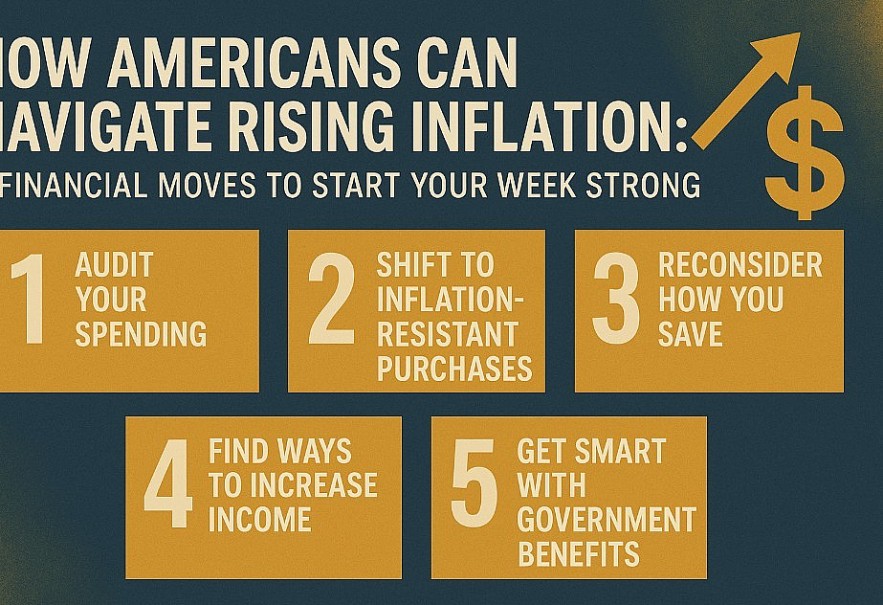How Americans Can Navigate Rising Inflation: 5 Financial Moves to Start Your Week Strong
 |
| How Americans Can Navigate Rising Inflation |
The Inflation Squeeze Is Real—Here’s What You Can Do Now
As millions of Americans wake up on Monday morning to rising gas prices, grocery bills, and rent, one question lingers: “How do I stay financially afloat in 2025?”
With inflation hovering around 4.8% nationally and wages struggling to keep pace, this cost-of-living crunch isn’t just an economic trend—it’s a daily reality.
But there’s good news: You’re not powerless. With smart adjustments and financial mindfulness, you can protect your income, rework your spending habits, and thrive—starting this week.
Let’s explore 5 high-impact financial moves that can help you stay ahead of inflation and start your Monday with confidence.
1. Audit Your Spending: Every Dollar Deserves a Job
In times of inflation, random spending becomes risky spending. The first step toward financial stability is visibility: know exactly where your money is going.
Action Plan:
-
Use free apps like Mint, You Need A Budget (YNAB), or Rocket Money to categorize expenses.
-
Identify recurring costs that no longer serve you (streaming subscriptions, meal delivery, etc.).
-
Set a “flexible budget” that accounts for price fluctuations in essentials like food and gas.
Pro Tip:
Don’t aim to cut everything. Instead, prioritize spending that supports your well-being and financial goals.
2. Shift to Inflation-Resistant Purchases
Prices are rising, but not all goods inflate at the same rate. Some purchases provide better long-term value—even during economic turbulence.
What to Buy Instead:
-
Bulk non-perishables (toilet paper, rice, pasta) — cheaper per unit.
-
Energy-efficient appliances — reduce long-term utility bills.
-
Refurbished electronics — save hundreds without sacrificing quality.
-
Used cars over new — as new vehicle prices remain sky-high.
Avoid: Trendy consumer electronics, “fast fashion,” and low-interest savings accounts (they lose purchasing power).
3. Reconsider How You Save: The 2025 Interest Rate Shuffle
Traditional savings accounts offer meager returns—but inflation eats away at your cash’s value daily.
Instead, optimize where you store your emergency fund and savings.
Alternatives Worth Considering:
-
High-yield savings accounts (4.5%+ APY) — many online banks now offer competitive interest.
-
I Bonds or TIPS — government-backed investments tied to inflation.
-
Short-term CDs — lock in decent rates while remaining relatively liquid.
Important:
Keep 3–6 months of essential expenses accessible, but don’t park excess funds in low-interest environments.
4. Find Ways to Increase Income—Not Just Cut Costs
While budgeting is vital, earning more is often a more scalable solution.
Ideas to explore this week:
-
Freelance gigs: Platforms like Fiverr, Upwork, or TaskRabbit.
-
Remote side hustles: Virtual assistant work, online tutoring, affiliate marketing.
-
Sell unused items: Facebook Marketplace, Poshmark, or OfferUp.
-
Ask for a raise: Present inflation data to justify cost-of-living compensation.
Mindset Shift:
Instead of “What can I cut?” ask: “What can I create or offer that adds value to others—and pays me for it?”
5. Get Smart with Government Benefits & Tax Breaks
Many Americans overlook the resources already available to them.
Don’t leave money on the table:
-
Check eligibility for food assistance (SNAP), energy support (LIHEAP), and local rent relief programs.
-
Use the IRS Tax Withholding Estimator to ensure correct deductions.
-
Explore childcare tax credits, healthcare subsidies, and student loan deferments if applicable.
Also:
Set a calendar reminder to file taxes early this year—refunds can be a vital buffer against price hikes.
Weekly Mindset: Control What You Can, Prepare for What You Can’t
Inflation is frustrating, but it doesn’t have to dictate your financial future.
Every Monday is a chance to:
-
Check your accounts
-
Revisit your budget
-
Set one financial goal
-
Learn one new strategy
This consistent practice will compound over time—just like your interest, investments, and confidence.
FAQs: Navigating Inflation in 2025
Q: Is inflation expected to keep rising through 2025?
A: While forecasts vary, most economists predict moderate inflation (~4-5%) for the rest of 2025 due to persistent supply chain issues, labor shortages, and high consumer demand.
Q: What’s the best place to keep my emergency fund right now?
A: A high-yield online savings account or money market account with a reputable institution is often best—balancing safety and decent returns.
Q: Should I stop investing during inflation?
A: No. In fact, investing in inflation-hedged assets like index funds, REITs, and TIPS can preserve and grow your wealth. Time in the market matters more than timing the market.
Q: How can I protect my retirement savings from inflation?
A: Diversify your retirement portfolio with a mix of equities, bonds, and inflation-linked securities. Consider consulting a fiduciary financial advisor.
Conclusion: Turn Inflation Stress Into a Financial Wake-Up Call
Inflation may be the enemy of easy spending—but it’s also an opportunity for financial transformation.
By auditing your spending, saving smarter, earning proactively, and staying informed, you don’t just survive Monday—you take charge of the entire week.
Because in 2025, resilience is your greatest financial asset.























